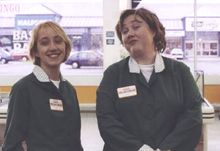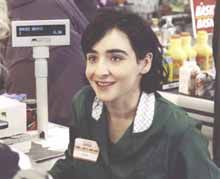 When did you first realise that you wanted to make films?
As far back as I can remember I was always going to be a doctor or a spy. At seventeen or eighteen I had a radical change of mind, probably brought on by some infatuation or other, and I decided to go to art college instead. As my drawing skills were fairly basic and I certainly couldn’t paint, I studied film, video and photography. As part of my course I did an exchange programme with a university in California but what was meant to be a term turned into the best part of four years and it was there that I made my first videos and ended up working for a local television station. How easy was it finding a first project that appealed to you?
I had been back in London for about 18 months when I met Rupert Graves whilst working as a facilities manager at an audio post production house. He showed me several scripts, they were all ok but then he told me about his idea for Checkout Girl. Three months later I had quit my job and we were holed up in his flat writing the script. This was September 1996 and I had no idea at this point how long it was going to take. We were a first time producer / director team although Rupert had a strong production background and had directed a few pop promos but I don’t think at this point I was intent on becoming a filmmaker – I just really wanted to make this film. How did you raise interest in the film?
Support for the project came very quickly. It was short listed for the Levi Firesign scheme and although they didn't take it into production, Michael Wrenn, then of Electric Pictures wrote us a great letter of support saying he would be interested in distributing the film on completion. We had a fantastic casting agent, Val Farron who Rupert had worked with previously. She knew exactly who to approach. Pauline Quirke came on board before Christmas and her agent, Steve Sheen was an absolute rock throughout the entire process. With Michael’s support, Pauline and Joe Dunton (BSC) as our DoP we were in a very strong position to move forward. Joe not only shot the film but supplied all the camera and grip equipment. His son Lester is the co-producer and a partner in the production company set up to make the film. I understand you had a near run-in with the US Military.
Oh yes. We were first scheduled to shoot in December of 1998 on an RAF base leased to the US Airforce. The whole place was in the process of being decommissioned but the base commissary (the supermarket) was still open and they were very happy for us to use it as our set over their three-day weekends. About five weeks before we were scheduled to shoot I got a call saying that the LA press office were unable to let us continue. Films shot on US bases need to promote the US armed forces and it’s recruitment. In all fairness everyone at the base felt terrible that we had gone so far down the line without being aware of the protocol but in the military I guess rules are rules and we were, unfortunately in breach of them. No amount of script doctoring was going to make us fit their criteria. What did you do then?
After having to call everyone to cancel the shoot I hid under my duvet for a week before resurfacing to reconsider our position. I reckoned the budget was going to go up by another £25,000 if we were going to even consider building a supermarket. To my surprise when I consulted the key cast and crew they all wanted to continue with the project and were happy to re-discuss their fees further down the line should it be necessary. It would be inappropriate for me to discuss the actual final fees but let’s just say that as film makers Rupert and I are totally indebted to everyone who worked on the film from our runners and local extras right up to the HoDs and main cast.In a perverse way the production was so big and had so much support I did not really have the option of giving up, although we often felt that we really had bitten off too much.  |